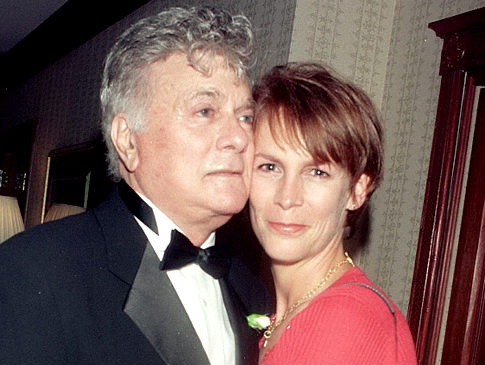When his handsome face and a stroke of luck brought Curtis to Hollywood in 1948, he was 23 years old and felt as if he was in heaven. That wasn’t because of the acting opportunities. It was because of the women, and Tony was one of the town’s best-known lotharios for decades. He loved acting, too, and made great films and bad ones with the same sense of fun. He was also a lifelong artist, whose paintings commanded decent fees, and a party animal until he got clean and sober in 1982. One thing you will not notice in the obituaries is anyone with a bad word to say about him. He was fun, and few had more fun than he did himself.
Curtis, born Bernard Schwartz in 1925 and raised in poverty and in an orphanage, finished Navy duty in World War Two, took acting lessons in New York, and in 1948 was spotted by a talent agent and signed by Universal Pictures. He was one of the most beautiful men to ever appear in the movies, and stardom came quickly. One day in 1985 at the Cannes Film Festival, he told me of those days:
“Let me tell you a story, sort of a parable. One day in 1948 I went to Hollywood. My name was Bernie Schwartz. I signed a contract at Universal, and I bought a house in the hills. It had a swimming pool. Unheated, but it had water in it. One night I came home late, I jumped in the pool, I swam a few laps, I got out, I dried myself off, I put on my clothes, and I walked directly into this room and sat down and started to talk to you. Do you see what I’m saying? Thirty-eight years, I don’t know where they went. Gone like that.”
He made four pictures that can be certainly be called great, and was crucial to the success of all four: “Some Like It Hot,” “The Sweet Smell of Success,” “Spartacus” and “The Defiant Ones,” for which he received an Oscar nomination. He made perhaps 60 others, some of them huge successes, others best forgotten. He worked on all of them with boundless energy. In an earlier conversation at Cannes 1982, he informed me he was trying to think of a better title for his new movie. The current title was “Othello, the Black Commando.”
“What do you think about ‘The Othello Conspiracy?'” he asked. “How about ‘The Othello File?’ ‘The Othello Connection?'” It was an action picture based on the Shakespeare tragedy. “My name is Colonel Iagovich,” he said. “Get it?”
This conversation took place in the suite of the overnight mogul Menahem Golan, whose Cannon Group would distribute the film. From the second floor of the Carlton Hotel, he commanded a view of the sidewalk. Suddenly he jumped to his feet and pressed his nose against the glass.
“Will ya look at the build on that lady!” he shouted. He pushed the curtain aside. “There — the one with the blonde hair and the leopard-skin leotard! See her?” I did not. “Standing in the middle of the intersection, chewing the hell out of that guy? Jesus, I got great eyes!” he said.
Menahem was not impressed. “She’s coming this way!” Curtis reported. He moved to another window. An overstuffed chair was in his way. He hurdled the chair. He opened the French doors leading to the balcony and shouted: ”Mon petit! Mon petit! Yoo hoo! Up here! Come up here, mon petit. Up here. Room 241! Two four one!”
The thing about Curtis was, here was a truly great star, a legend, who had a big libido but not a big ego. How many other movie stars would pull up their shirt in a restaurant to show you their scar from heart surgery?
Once Wolfgang Puck hung an exhibition of Curtis’s paintings in his original Spago on Sunset. Puck and the director Billy Wilder, who directed “Some Like it Hot,” were both from Vienna and loved talking with one another. One night, Puck told me, he had Billy, a famed art collector, get up and inspect some of the paintings.
“Billy looked at one,” Puck said, “and all he said was, ‘Lousy actor, lousy painter.’ Then he turns around and Tony was standing right there. He doesn’t miss a beat. ‘Oh, hello Tony,’ he says. ‘I knew all along you were standing right there’.”
Many people liked his paintings. He wasn’t a lousy actor, but he often suffered because of his material. He would joke about bad reviews, but one really stung. It wasn’t a review, really, but a myth that grew famous over the years. That was the story that in “The Black Shield of Falworth” his Brooklyn accent had him saying “Yonder lies dah castle of my faddah.”
“I never said Yonder lies da castle of my faddah! he told me. “That line has become part of the folklore. You go to see the movie, listen for yourself. What I said was, clear as day, father. See, I was born Bernie Schwartz. I’m a Hungarian Jew from The Bronx. So they thought I had to pronounce it faddah, because it fit their stereotype. Lawrence Olivier was in the same picture, but nobody thinks he ever mispronounced anything in his whole life.”
Actually, Lord Olivier only co-starred with Curtis in “Spartacus,” but I got the point.
Bernie Schwartz from The Bronx and Tony Curtis from Hollywood died Wednesday at his home near Las Vegas. He was 85. His sixth wife, the horse trainer Jill VandenBerg, was at his side. Together they supported a refuge for abandoned horses in Nevada.
In addition to his wife, Mr. Curtis’s survivors include two daughters with Janet Leigh, his first wife: Kelly Lee Curtis and the actress Jamie Lee Curtis. Also Alexandra Curtis and Allegra Curtis, daughters with his wife Christine Kaufmann; and a son, Benjamin Curtis, with his wife Leslie Allen.












